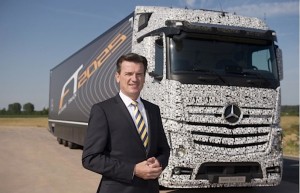
Dr. Wolfgang Bernhard shows off Daimer Truck's Future Truck 2025 that uses the maker's Highway Pilot System to drive autonomously.
In the ‘70s classic movie, “Duel,” a seemingly driverless tanker truck terrorizes an innocent salesperson driving to his next call along a remote stretch of highway. Could a driverless big rig – minus the stalkerish behavior – be part of our future?
Daimler Trucks thinks so. In fact, it’s betting big on it and showed its ante with the introduction of its Future Truck 2025 earlier today in Germany. Using the truckmaker’s Highway Pilot system, the prototype semi-truck is capable of driving itself while hauling a full load at speeds exceeding 50 mph, according to the company.
“The truck of the future is a Mercedes-Benz that drives itself.” Dr. Wolfgang Bernhard, the member of Daimler’s Board of Management responsible for Daimler Trucks and Buses, at the debut of the truck earlier today.
Much of the focus on driverless vehicles spotlighted smaller, passenger cars. However, there is nothing to suggest similar technologies couldn’t be applied to commercial trucks.
“Autonomous driving will revolutionize road freight transport and create major benefits for everyone involved. With the Future Truck 2025, Daimler Trucks is once again highlighting its pioneering role in innovative technologies and opening up a new era in truck transport. We aim to be the number one manufacturer in this market of the future, which we believe will offer solid revenue and earnings potential.”

Dr. Wolfgang Bernhard suggested that autonomous trucks will change the role of drivers in the future and eliminate the shortage of drivers in Europe.
There are plenty of potential benefits to be gleaned from a driverless semi-truck. Truck makers and suppliers have been developing new safety systems aimed at helping drivers be safer and offset issues, such as drowsy driving, that impact road safety.
For example, the Lytx DriveCam system could reduce the number of fatal bus and truck crashes by at least 20%, saving more than 800 lives a year, by allowing companies to retrain drivers to avoid risky behaviors while behind the wheel.
(Mazda to reveal new MX-5 Miata on Sept. 3. For more, Click Here.)
In fact, Bernhard noted that an autonomous vehicle could allow truckers to take on new roles while still in the cab of a truck.
“It will not only free them from having to perform monotonous tasks; it will also give them more time for tasks that were previously handled by office workers at shipping companies,” he said. “In other words, it will be possible for truckers to advance to new positions as transport managers, making truck driving a more attractive profession. Autonomous driving could thus help to resolve the shortage of truck drivers.”
(Click Here for details about how a looming dock workers strike could hurt auto sales.)
Google and several other U.S. manufacturers are in various levels of testing autonomous vehicles. Some expect these vehicles to be on U.S. roads within the next five to seven years and state and local governments are in the process of establishing the “rules of the road” for these vehicles.
However, the Future Truck represents a new movement in the segment. Right now, Mercedes seems to be focusing its energy on developing the truck for use in European Union countries. In fact, the truck has already taken an initial trip on a highway near Magdeburg, Germany.
The purpose of the introduction today was “establish an ongoing dialogue with all stakeholders about the conditions for transport in the future, in which self-driving trucks will play a major role,” the company said.
(To see how Hurricane Arthur could dampen record holiday driving season, Click Here.)
Bernhard suggested that legislative issues regarding the use of autonomous trucks need to be at the forefront of trade and commerce discussions because the technology is developing so quickly.
Also “developing” is the growth of truck traffic in the EU. A recent study conducted by ProgTrans AG predicts that freight transport volumes in the EU will increase by approximately 20% by 2025 with trucks accounting for about 75% of all freight transported by road in the EU.
The volume of road transport in Germany alone will increase from 3.7 billion tons today to nearly 5.5 billion tons by 2050, according to the country’s Ministry of Transport and Digital Infrastructure.

These autonomous vehicles present opportunities and problems. We’ll see how it all works out.